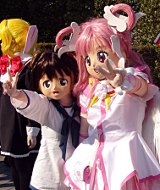Useful notice
Embassy of Japan in the UK 101-104 Piccadilly, London , W1J7JT Tel.::020 7465 6565 Fax.:020 7491 9328 Web.: www.uk.emb-japan.go.jp
Cultural institute of Japan (Japan Foundation) Russel Square House, 10-12 Russel Square, London WC1B 5EH, U.K. Tel.:44-20-7436-6695 Fax: 44-20-7323-4888 Web: www.jpf.go.jp
British embassy in Tokyo, Japan No 1 Ichiban-cho, Chiyoda-ku, Tokyo 102-8381, Tokyo Tel.:(+81)(3) 5211-1100 Fax:(+81)(3) 5275-3164 Web.:www.ukinjapan.fco.gov.uk
GENERAL INFORMATION
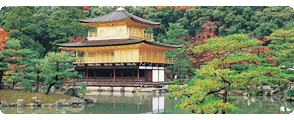
Japan is an insular country, with a group of 4 bigger islands in the middle and about other 4000 smaller islands. The major 4 islands are called (from north to south): Hokkaido, Honshu, Shikoku, Japan occupies an area of 377.708 km². The majority of islands are covered with mountains and some of them are volcanic mountains. Japan hosts about 126 million people and the wide area of Tokyo counts itself 35 million inhabitants; it is the capital city of Japan, nevertheless the biggest metropolitan city in the world.
VISA
For all the tourists coming from EU, Lichtenstein and Switzerland that enter Japan a normal passport is enough, but it needs to be valid for at least 6 month after the return to their hometown.
For a stay of less than 6 months a special visa is not required; at the entrance/expatriation it is necessary to fill out a special document.
MONEY & CREDIT CARD
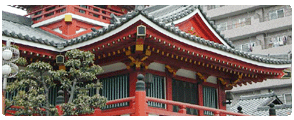
The japanese currency is the Yen. There are no cents but only entire units. The money exchange value is: 1 EUR = 133.57 Yen (JPY) and
1 GBP = 152.89 Yen (JPY) (updated on September 2009). There are banknotes of 1, 5, 10, 50, 100 and 500 Yen, but also for 1.000, 2.000, 5.000 and 10.000. The foreign tourist's coins and checks can be brought both in and out without any problem. When going out Japan nobody can bring with him/her more than 5.000.000 as ceiling limit. The money exchange to japanese Yen is always possible but often disadvantageous. The credit cards like American Express, Visa or Eurocard/Mastercard are accepted in hotels, Ryokans, shops and banks. The checks of foreigners are to exchange in the banks and the whole process might be a bit complex. The place where it is possible to get any easy money exchange is in the airports. Banks in Japan are opened from Monday to Friday, from 9.00 to 15.00. It is possible to take money from the APTs located in the post offices and in the Convenience Store 7 Eleven.
HEALTH ASSISTANCE
The health assistance in Japan is comparable to the one in Europe. In the sanitary, technical and logistic environments everything proceeds without problems. In the big cities the doctors speak both english and german in order to facilitate the communication with the european patients.
HEALTH SERVICES

The health service provided by the Ministry of Foreign Affairs advices the following vaccinations: protection against tetanus, diphtheria, polio and hepatitis A. For a longer stay (more than 3 months) it is better to have a vaccination also against hepatitis B. Further information are available at the Ministry of foreign affairs.
FESTIVITY DAYS
1st of Janauary, New Year's Day
2nd Monday of January, adults' day
11th of February, state foundation anniversary
20th or 21th of March, spring begin
29th of April, golden week's begin
3rd of May, Constitution's day
4th of May, day of the green
5th of May, international children's day
3rd Monday of July, sea day
3rd Monday of September, tribute to the senior citizens
23th or 24th of September, autumn begin
2nd Monday of October, sport and health day
3rd of November, day of the culture
23rd of November, day of the work
23rd of December, Emperor's birthday
If a festivity day happens to be on Sunday, then it is celebrated on the following Monday
The 25th of December is not a festivity day
From the 28th of December to the 3rd of January all the authorities, public offices, banks and other offices are closed; only the majority of shops is open.
LANGUAGE
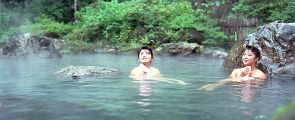
The official language is Japanese. From the third class in the primary school children learn English. If there are any problems it is better to communicate with young people because almost all of them know English. It is advisable to speak slowly and clearly though. Sometimes writing down what one wants to say can be of help.
TAXI / TRAIN
Almost everywhere there is plenty of buses and it is not so difficult to find one. The rail system in Japan is one of the most developed worldwide. To travel long distances the best and more comfortable transport is always the train, or better the express one called "Shinkansen". The trains that connect the cities are regular and almost always punctual. In the bigger cities like Osaka, Tokyo, etc. there is also a widely developed subway system.
TIME ZONE
The difference between the MEZ and Japan is of 8 hours more (9 more from Ireland). During the summer the difference gets reduced to 7 hours (8 from Ireland). Therefore during the winter, for example, when in London is 10.00 o'clock in Tokyo is already 18.00.
CLIMATE
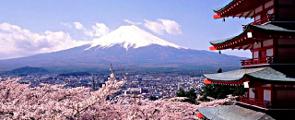
In Japan there are four different seasons, each of them with its own characteristics, just like in most of the european countries. The best seasons in which to visit Japan are spring and autumn.
Spring: the spring gets announced by the fabulous blooming of the peach trees, and its top moment is in April, when also the cherry trees get covered by wonderful flowers. It is advisable to bring middle-season clothes and thin sweaters.
Summer: the rain-period finds its peak time during three or four weeks in June and then is followed by an unbearable heat in July. The air humidity reaches pretty high levels and this is the reason why many japanese people bring always a towel with them.
Autumn: A light and fresh wind brings a general relief and pleasant temperatures. The first picture of the autumn in Japan that comes in mind is a romantic carpet of coloured leaves.
Winter: usually in the flat land on the pacific coast there is more than 0°C and it is quite arid but, still, it is advisable to bring a good coat. While in the northern part of Japan the winter is quite strong, in the southern part the temperatures keep more moderate (for example in Okinawa).
HOTELS & ACCOMMODATIONS
In Japan we can distinguish between two different types of accommodation facilities: from the one hand there are the typical occidental-style hotels and on the other hand it is possible to taste the real japanese lifestyle by going into a traditional oriental hotel. The latter are called Ryokan and they give visitors great chances to experience an overnight stay dip into the japanese atmosphere. On the floor of every room there are soft straw mats and the well known Tatami, on which you can walk only barefoot or with the socks. The cupboard's doors are made of Washi paper sheets. Before entering it is a must to take off the shoes. In each room there are moccasins and one cotton Kimono (called Yukata), which is possible to wear in the room and in the Ryokan for example when going to the bathroom. Men and women wear the same Yukata at home. Before entering the hot bath, which is divided into men and women, it is necessary to get properly washed. The Ryokan hotels are usually a bit more expensive than the other hotels of the same category. The western-style hotels are of a high standard too. The majority of the big hotels have a personal bus connection from the main stations or airports to the hotel itself.
TOKYO
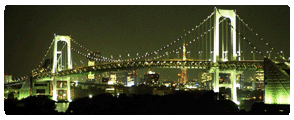
In 1868 Tokyo became the main city of Japan. From that year on the metropolitan city is the political and economical centre of the country. It is located in the southern coast, in the so called Tokyo bay. In the northern part of Tokyo there is the Kanto flat land. The city is divided into 23 different administrative zones. From the quiet park of Meiji over the chaotic and overcrowded district of Nakamise till the skyscrapers of Shinjuku, Tokyo offers a large variety of lifestyles that impress immediately the visitors each of them with its single charm.
